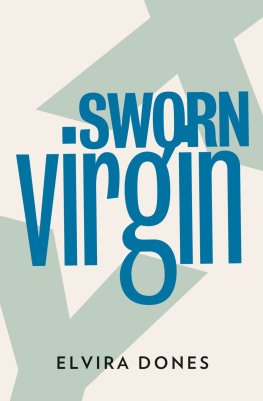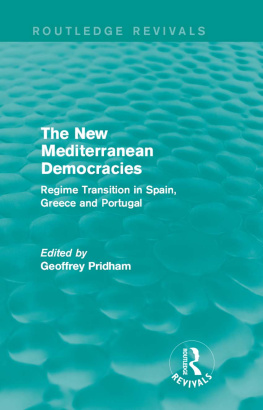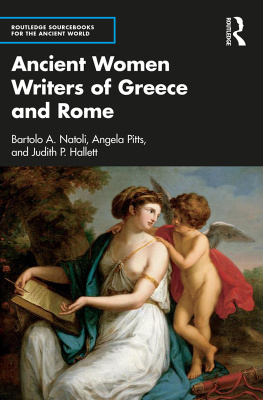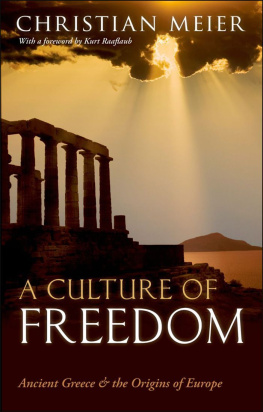
Bride of Hades to Bride of Christ
This volume argues that ancient Greek girls and early Christian virgins and their families made use of rhetorically similar traditions of marriage to an otherworldly bridegroom in order to handle the problem of a girls denied or disrupted transition into adulthood.
In both ancient Greece and early Christian Rome, the standard female transition into adulthood was marked by marriage, sex, and childbirth. When problems arose just before or during this transition, the transitional girls status within society became insecure. Walker presents a case for how and why the dead Greek virgin girl, depicted in Archaic through Hellenistic sources, in both texts and inscriptions, as a bride of Hades, and the life-long female Christian virgin or celibate ascetic, dubbed the bride of Christ around the third century CE , provide a fruitful point of comparison as particular examples of strategies used to neutralize the tension of disrupted female transition into adulthood.
Bride of Hades to Bride of Christ offers a fascinating comparative study that will be of interest to anyone working on virginity and womanhood in the ancient world.
Abbe Lind Walker is a Visiting Assistant Professor of Classics at Connecticut College, USA. Her research unites multiple strands of interest, including gender in antiquity, religions in the ancient Mediterranean, and the social and cultural history of classical Greece and late antique Rome. This is her first book.
Routledge Monographs in Classical Studies
Titles include:
Emotional Trauma in Greece and Rome
Representations and Reactions
Edited by Andromache Karanika and Vassiliki Panoussi
The Representation of Slavery in the Greek Novel
Resistance and Appropriation
William M. Owens
Memories of Utopia
The Revision of Histories and Landscapes in Late Antiquity
Edited by Bronwen Neil and Kosta Simic
The Making of Identities in Athenian Oratory
Edited by Jakub Filonik, Brenda Griffith-Williams, and Janek Kucharski
Homicide in the Attic Orators
Rhetoric, Ideology, and Context
Christine Plastow
Underworld Gods in Ancient Greek Religion
Ellie Mackin Roberts
Bride of Hades to Bride of Christ
The Virgin and the Otherworldly Bridegroom in Ancient Greece and Early Christian Rome
Abbe Lind Walker
Intertextuality in Senecas Philosophical Writings
Edited by Myrto Garani, Andreas Michalopoulos, and Sophia Papaioannou
For more information on this series, visit: www.routledge.com/classicalstudies/series/RMCS
Bride of Hades to Bride of Christ
The Virgin and the Otherworldly Bridegroom in Ancient Greece and Early Christian Rome
Abbe Lind Walker
First published 2020
by Routledge
2 Park Square, Milton Park, Abingdon, Oxon OX14 4RN
and by Routledge
52 Vanderbilt Avenue, New York, NY 10017
Routledge is an imprint of the Taylor & Francis Group, an informa business
2020 Abbe Lind Walker
The right of Abbe Lind Walker to be identified as author of this work has been asserted by her in accordance with sections 77 and 78 of the Copyright, Designs and Patents Act 1988.
All rights reserved. No part of this book may be reprinted or reproduced or utilised in any form or by any electronic, mechanical, or other means, now known or hereafter invented, including photocopying and recording, or in any information storage or retrieval system, without permission in writing from the publishers.
Trademark notice: Product or corporate names may be trademarks or registered trademarks, and are used only for identification and explanation without intent to infringe.
British Library Cataloguing-in-Publication Data
A catalogue record for this book is available from the British Library
Library of Congress Cataloging-in-Publication Data
Names: Walker, Abbe Lind, author.
Title: Bride of Hades to bride of Christ : the virgin and the otherworldly bridegroom in ancient Greece and early Christian Rome / Abbe Lind Walker.
Identifiers: LCCN 2019049621 (print) | LCCN 2019049622 (ebook) |
ISBN 9781138481626 (hardback) | ISBN 9781351060196 (ebook)
Subjects: LCSH: Single womenGreeceHistory. | Single womenRomeHistory. | VirginsGreeceHistory. | VirginsRomeHistory. | Marriage customs and ritesGreeceHistory. | Marriage customs and ritesRomeHistory. | WomenGreeceHistoryTo 500. | WomenRomeHistoryTo 500. | Civilization, Classical.
Classification: LCC HQ800.4.R57 W35 2019 (print) | LCC HQ800.4.R57 (ebook) | DDC 306.81/530938dc23
LC record available at https://lccn.loc.gov/2019049621
LC ebook record available at https://lccn.loc.gov/2019049622
ISBN: 978-1-138-48162-6 (hbk)
ISBN: 978-1-351-06019-6 (ebk)
Typeset in Times New Roman
by Newgen Publishing UK
Contents
PART I
Virgin suicides
PART II
Parents of the bride
I would like to begin by thanking those whose support and encouragement both inspired this project and helped me get it to the finish line. First and foremost, my deepest thanks to Radcliffe Edmonds, who has offered guidance, unwavering support, and a significant amount of precious time at every stage. Sincere thanks go to Catherine Conybeare, whose Fall of Rome seminar opened my eyes to a whole new world of research, and whose sound advice has been invaluable to me. I also want to thank all my teachers and professors who have nurtured my interest in the lives of women in the ancient world, starting with Roger Barrows, my legendary humanities teacher; Laurel Fulkerson, Svetla Slaveva-Griffin, and John Marincola, my incomparable professors at FSU; and Darby Scott, Annette Baertschi, and Asya Sigelman, who all helped me see the merits of Latin poetry and Greek meter. Thank you to Lee Pearcy, Maggie Beeler, Eleanor Mulhern, Lisa Maurizio, and the anonymous readers for Routledge for contributing your time and expertise and providing me with valuable constructive comments. Thank you also to those who participated in the Women and Agency panel at the 2018 SCS meeting, particularly Lesley Dean-Jones, for helping me refine some of my ideas. My gratitude also to Amy Davis-Poynter, Lizzi Risch, and Ella Halstead at Routledge for their help, encouragement, and patience.
Finally, thank you to my family, and especially my mom, who has endured years of me talking through ideas. This book is dedicated to my favorite person in the world, Tradd.
Most of the abbreviations used for the names and works of ancient authors throughout the volume follow the conventions of the Oxford Classical Dictionary, 4th ed., Oxford: Oxford University Press, 2012. Other abbreviations are as follows:
| CEG 1 & 2 | Carmina epigraphica Graeca |








